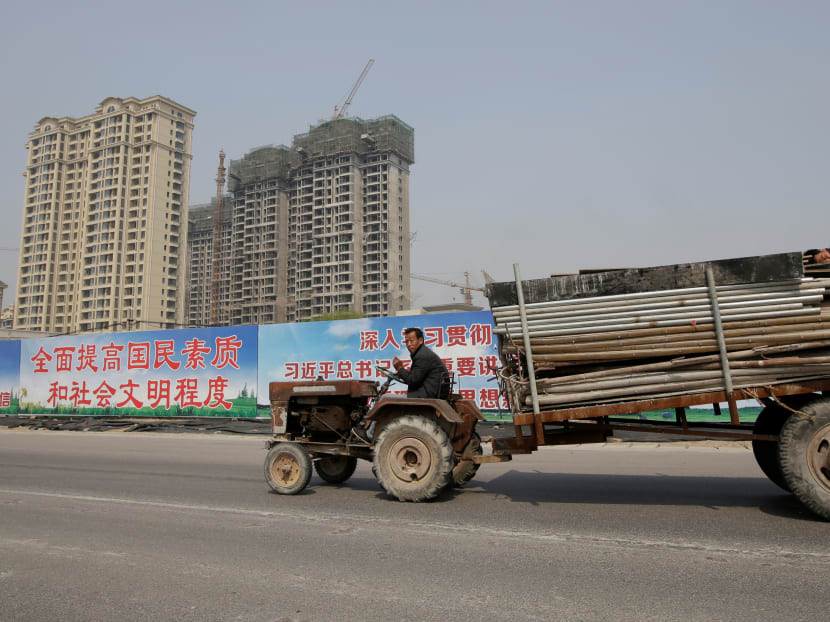Will Xiongan become China’s third growth engine?
The establishment of the Xiongan New Area is too important for China watchers to ignore, as it is a key decision by the Chinese authorities that will affect the country’s future political and economic outlook.

A man drives a tractor carrying building materials past a property under construction, which has been closed to sale, as the government banned new property sales in counties earmarked as part of a new special economic zone in Xiongxian county, Hebei province, China, April 3, 2017. Photo: Reuters
The establishment of the Xiongan New Area is too important for China watchers to ignore, as it is a key decision by the Chinese authorities that will affect the country’s future political and economic outlook.
Will Xiongan become a third economic engine just as the Shenzhen Special Economic Zone (SEZ) did in the 1980s, helping to kick-start China’s market reform, or the Shanghai Pudong New Area did in 1993, supporting the country’s opening-up?
The impact may not be as deep or as quick. At this stage the creation of Xiongan New Area near the country’s capital Beijing appears to have more political significance than economic.
It is true that Xiongan New Area was born with a silver spoon in its mouth. The announcement was released on April 1 jointly by the State Council and the Central Committee of the Communist Party, in a more low-key manner than the creation of the Shenzhen SEZ and Pudong New Area.
The official Xinhua News Agency emphasised the status of Xiongan as “a national-level new area after the Shenzhen Special Economic Zone and the Shanghai Pudong New Area.”
Clearly, China’s authorities envisage Xiongan as a driver of economic growth in the Beijing-Tianjin-Hebei region — its two predecessors had respectively supported the growth of the Pearl River Delta in the south and the Yangtze River Delta in the east.
Xinhua also stressed that Xiongan is the country’s “big millennial plan.” In China’s political vocabulary, the government often talks about a certain project being a “big centennial plan” to emphasise its long-term importance.
The rare use of “millennial plan” certainly highlights the strategic significance of this project, and it will be difficult to assess its success in the short term.
Beijing is China’s capital. It is also the leader of the Beijing-Tianjin-Hebei economic centre planned by the current administration for North China. Previous administrations have struggled with trying to balance Beijing’s burden of doubling as a metropolis and a political centre.
Now the picture is becoming clearer: many of its metropolitan functions will be transferred to Tongzhou district in what used to be Beijing’s suburban east; and Xiongan, some 100 kilometres to the south, will shoulder part of Beijing’s “non-capital” function, such as developing high-tech industries. Tongzhou and Xiongan are now like Beijing’s two wings.
However, Xiongan will not be able to compare economically with Pudong or Shenzhen in the near future. Shenzhen took off on the back of neighbouring Hong Kong. Pudong relied on Shanghai’s role as an international financial and trade center.
What is more, the Pearl River Delta and the Yangtze River Delta were natural hot spots that were already home to manufacturers and big businesses. Xiongan and its neighboring areas in Hebei have no similar economic might. Instead, Xiongan may prove to be a place where the state government can focus on its experiments with urbanisation, supply-side reform and even state governing models.
Is there going to be a housing bubble in Xiongan? Probably.
Although Xiongan is trying to freeze housing transactions now, it will not be possible to stop local housing prices from rising. Developers will not let such an opportunity pass them by.
When Xiongan’s housing prices do rise, will it cushion the growing momentum of Beijing’s property prices? Maybe a little, but it depends on the degree to which Beijing’s non-capital functions are transferred to Xiongan.
Will Xiongan help to relieve Beijing’s traffic problems? Not for now. Metropoles like New York, Tokyo and London need perfect transport connections between their satellite cities. But Beijing has not yet achieved this. Although it may take less than an hour to travel from Beijing to Xiongan on the planned high-speed rail, Beijing’s congestion will inhibit access to the station.
The central government has appointed Xu Qin, former Shenzhen mayor and party chief, to become a deputy party chief of Hebei province. Many are expecting him to make use of his nine year’s of experience in Shenzhen to aid the development of Xiongan. However, it is not yet clear if the birth of Xiongan New Area will lead to a resurgence of the “China model” in terms of metropolitan development and economic restructuring. CAIXIN
ABOUT THE AUTHOR:
Nie Huihua is a professor of economics at Renmin University of China






